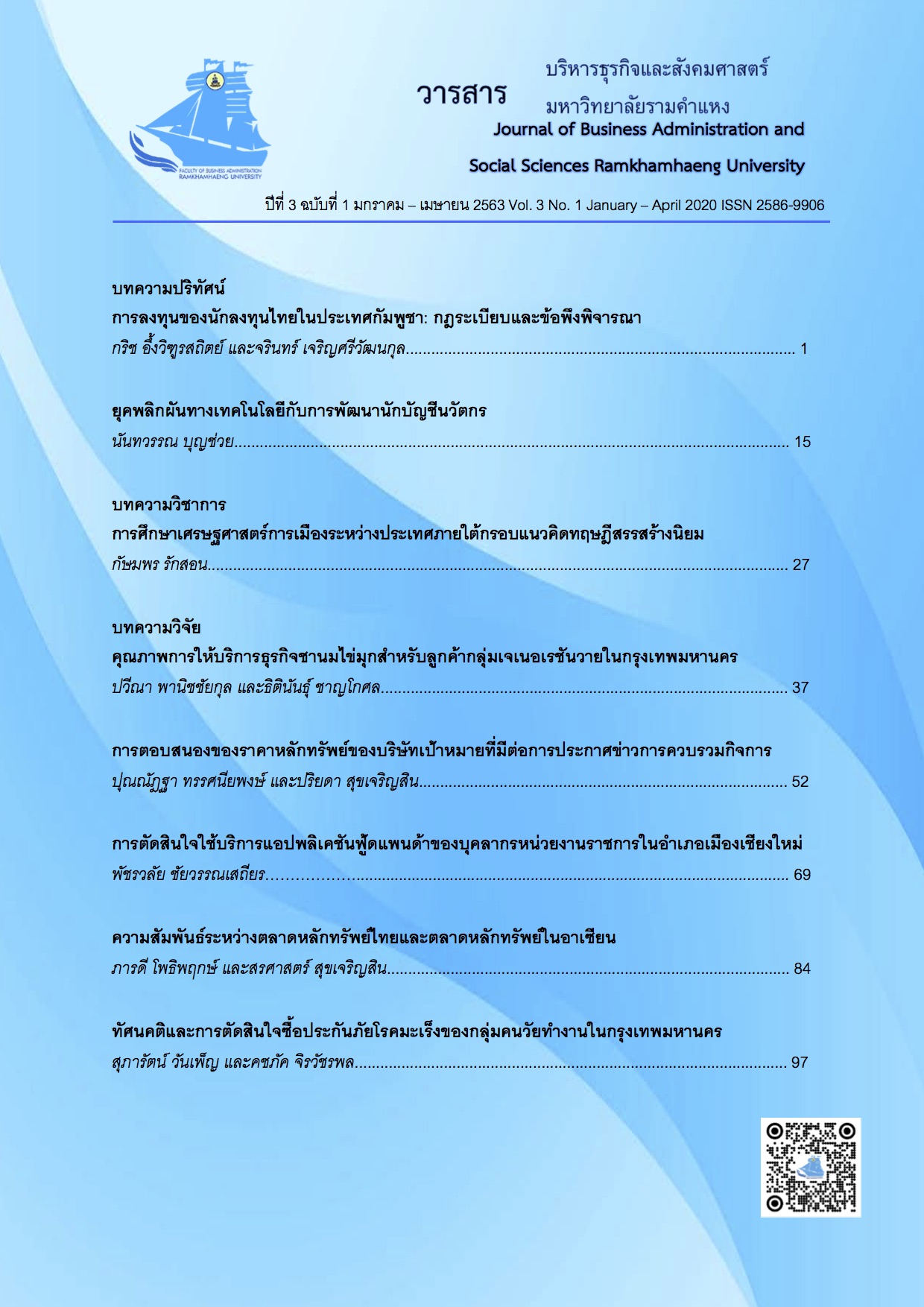The Study of International Political Economy under the Concept of Constructivism
Main Article Content
Abstract
In this research investigation, the researcher studies the science of international political economy under the concept of constructivism which has become an alternative to explain the context of international political economy. The focus is to rationalize why a state has changed the behavior of the public sector i.e. changes in ideas, identities, norms, and social interactions and how these changes affect the world political economy. Such changes and interactions also reciprocally connect the social framework within a government and international norms in an appropriate manner. Although constructivism may not be widely accepted in the science of international political economy, constructivism can be an alternative for further studies such as cross-border economies, global market changes, and changes in the norms in international economic organizations.
Article Details
เนื้อหาและข้อมูลในบทความที่ลงตีพิมพ์ในวารสารบริหารธุรกิจและสังคมศาสตร์ มหาวิทยาลัยรามคำแหง ถือเป็นข้อคิดเห็นและความรับผิดชอบของผู้เขียนบทความโดยตรง ซึ่งกองบรรณาธิการไม่จำเป็นต้องเห็นด้วย หรือร่วมรับผิดชอบใดๆ
บทความ ข้อมูล เนื้อหา รูปภาพ ฯลฯ ที่ได้รับการตีพิมพ์ในวารสารบริหารธุรกิจและสังคมศาสตร์ มหาวิทยาลัยรามคำแหง ถือเป็นลิขสิทธิ์ของวารสารบริหารธุรกิจและสังคมศาสตร์ มหาวิทยาลัยรามคำแหง หากบุคคลหรือหน่วยงานใดต้องการนำบทความทั้งหมดหรือส่วนหนึ่งส่วนใดไปเผยแพร่ต่อ หรือเพื่อกระทำการใดๆ จะต้องได้รับอนุญาตเป็นลายลักษณ์อักษรจากวารสารบริหารธุรกิจและสังคมศาสตร์ มหาวิทยาลัยรามคำแหง ก่อนเท่านั้น
References
Acharya, A. (1998). Collective identity and conflict management in Southeast Asia. In E. Adler and M. Barnett (Eds.), Security Communities (pp. 198-227). Cambridge: Cambridge University Press.
Acharya, A. (2004). How ideas spread: Whose norms matter? Norm localization and institutional change in Asian regionalism. International Organization, 58(2), 239-275.
Acharya, A. (2010). The Idea of Asia. Asia Policy, 9(1), 32-39.
Acharya, A. (2013). Constructivism and the study of global IR, presented at the Workshop on the Future of Constructivist Research, Centre for International Studies, Oxford University, Retrieved July 25, 2018, from http://amitavacharyaacademic.blogspot.com/2014/02/constructivism-and-study-of-global-ir.html.
Acharya, A. & Johnston, A. I. (2007). Crafting Cooperation: Regional International Institutions in Comparative Perspective. Cambridge: Cambridge University Press.
Delanty, G. (1997). Social Science: Beyond Constructivism and Realism. Buckingham: Open University Press.
Finnemore, M. & Sikkink, K. (1998). International norms and political change. International Organization, 52(4), 887-917.
Florini, A. (1996). The evolution of international norms. International Studies Quarterly, 40(3), 363-389.
Kang, X. (2010). Perception of interests and internalization of international norms. World Economics and Politics, 1, 66-83.
Kat, M. (2015). A Conceptual Analysis of Realism in International Political Economy. Retrieved July 20, 2018, from https://www.e-ir.info/2015/04/16/a-conceptual-analysis-of-realism-in-international-political-economy/
Katzenstein, P. (2005). A World of Regions: Asia and Europe in the American Imperium. Ithaca, London: Cornell University Press
Keohane, R. O. (1984). After Hegemony: Cooperation and Discord in the World Political Economy. Princeton, NJ: Princeton University Press.
Konings, M. (2010). Neoliberalism and the American state. Critical Sociology, 36(5), 741-765.
Lang, A, T. F. (2016). Reconstructing embedded Liberalism: John Gerard Ruggie and constructivist approaches to the study of the international trade regime. In, J. G. Ruggie (Ed.), Embedding Global Markets: An Enduring Challenge (pp. 81-116). Routledge: Oxfordshire.
Martin, L., & Simmons, B. (1998). Theories and empirical studies of international institutions. International Organization, 52(4), 729-757.
Searle, J. (1995). Construction of Social Reality. New York: Free Press.
Söderbaum, F., & Shaw, T. M. (2003). Theories of New Regionalism: A Palgrave Reader. Houndmills: Palgrave Macmillan.
Thies, C. G., & Wehner, L. E. (2019). The role of Role theory in international political economy. Cambridge Review of International Affairs, 32(6), 712-733.
Wang, Q., & Blyth, M. (2013). Constructivism and the study of international political economy in China. Review of International Political Economy, 20(6), 1276-1299.
Wendt, A. (1994). Collective identity formation and the international state. American Political Science Review, 88(2), 384-396.
Wendt, A. (1999). Social Theory of International Politics. Cambridge: Cambridge University Press.


